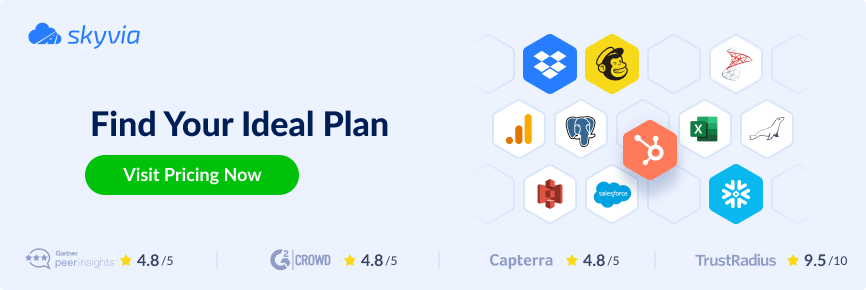Have you ever had a feeling of dealing with an avalanche of data that only speeds up and never slows down? Probably, yes. That’s not just a mirage as the amount of digital data constituted 33 zettabytes in total by 2018, while this number reached 97 zettabytes in 2022. Believe it or not, the data volume has tripled over 4 years.
So what does it mean? Digital data comes from everywhere – social media, surveillance systems, business applications, and so on. And companies have to deal with all that, which seems scary. The good news is that data integration and processing tools provide all the instruments to benefit from the data stream for the business.
By now, around 67% of enterprises employ data integration tools in their workflows to aggregate data and assess it. Celigo is one of those as it combines data from various applications, which opens new horizons for automating business processes. So how would you benefit from such tools as Celigo or its alternatives?
Everything is simple – imagine yourself in the library where books from multiple publishing houses are brought together and perfectly arranged based on genre. Similarly to a library, Celigo contains orchestration mechanisms to put data in order.
In this article, you’ll find out which particular data integration scenarios and businesses Celigo would be suitable for. You’ll also discover Celigo alternatives that would be applicable to other data integration scenarios. As a result, based on the description of the strengths and weaknesses of Celigo and its alternatives provided in this article, you’ll decide which tool would be perfect for your particular case.
Table of Contents
About Celigo
As companies mature, new systems and applications are added to business processes. In most cases, these applications need to share data with each other. Building API integration processes could be slow, time-consuming, and costly, so here comes Celigo to put everything in order.
Celigo is a complete integration Platform-as-a-Service (IPaaS) for IT and business users. It makes business processes automated across applications by offering advanced orchestration, transformation, and customization settings. Thus, you can set up a data flow across applications for synchronizing, replicating, analyzing, or performing any other operations with data.
The Power of Celigo
This tool helps businesses to arrange and coordinate their operations. It gathers data from various apps providing a general overview of all the company’s processes. Also, Celigo brings a wide range of other benefits described below in detail.
- User-friendly. This platform requires a low-code experience only, which would be suitable even for users with primary technical expertise.
- Scalable. With this IPaaS platform, integrate data from as many data sources as your business needs.
- Resource-saving. Celigo saves plenty of human work and monetary resources.
- Reliable. This tool is extremely secure as it provides advanced encryption and authentication features for data protection.
- Accurate. This IPaaS platform guarantees a considerable reduction in data errors.
Empowering Businesses with Celigo Advantage
Services provided by Celigo are dedicated to resolving business-related tasks within various sectors and company departments. Below, we provide several examples of how this tool could be implemented in work scenarios.
Business Analysis
As the platform has plenty of pre-build automation, non-technical or business users won’t need to apply much effort to tune everything up. They’ll only have to design business logic for outlining the rules of data extraction from different applications. The data ingested with Celigo is later used in BI applications for building dashboards and driving conclusions out of it. The system implements AI for automatic error detection in data to prevent erroneous analytic findings.
Finance
Taking all financial operations under control is challenging for businesses. This usually involves manual data transfer which might cause faults, data duplicates, and delays in financial reports. Celigo comes to resolve such an issue by integrating CRM with ERP applications for ensuring financial integrity for businesses. As a result, businesses get a holistic overview of the financial situation and detect any misalignments between sales and finance.
Human resources
Recruiters and HR managers have to deal with lots of people on a daily basis. This consequently leads to enormous data amounts about candidates for open job positions, current employees, and HR processes. Celigo makes it possible to take everything in order and automate HR processes: employee data management, hiring, and onboarding.
Best Celigo Alternatives
Even though Celigo is a great IPaaS platform with multiple functions, it’s not the best fit for each and every data integration scenario. That’s why we’d like to present some Celigo alternatives for working with data. Those are Celigo competitors, in fact, that also have data integration in mind but offer some extra features.
Skyvia: Top-notch Celigo Alternative for Your Business
One of the best Celigo alternatives for data ingestion and data transformation is the Skyvia cloud platform. It allows you to integrate data from cloud apps, databases, and data warehouses.
Skyvia would be a win-win fit for any business as it embeds ELT, ETL, and Reverse ETL solutions. It also ensures data synchronization, workflow automation, and building advanced data pipelines. This set of functions makes business processes work as smoothly as a cogwheel.
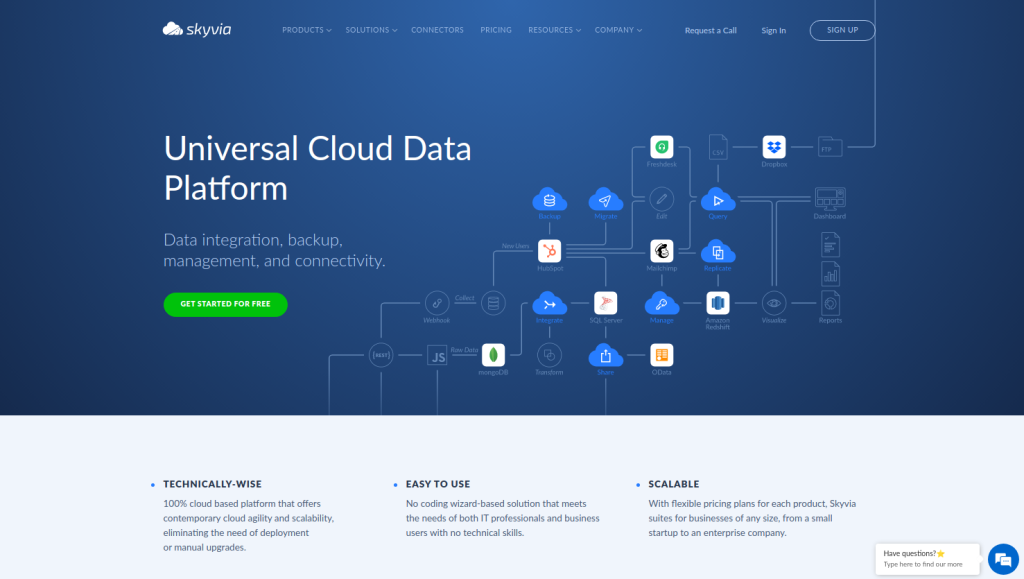
Being a universal data platform, Skyvia offers lots of data integration scenarios. However, we’ll focus on the two ETL scenarios: conventional Data Import involving two platforms and advanced Data Flow for elaborating on complex data pipelines.
Data Import
This is one of the most popular and widely used scenarios of data integration. It allows data migration between different platforms – loading CSV files as well as data from cloud apps and databases.
To properly set up the Data Import integration, you’ll need to indicate several parameters for the data transfer path, batch size, scheduling, etc. As Skyvia performs all those processes based on the ETL technology, data transformation and mapping would also be needed in most cases. This is defined via the task settings coming along with the data import parameters mentioned above.
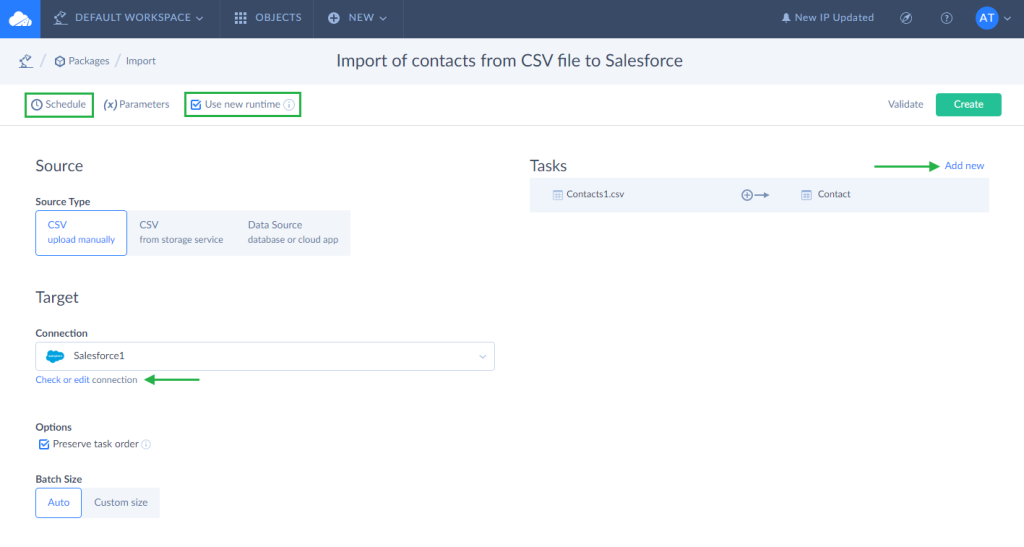
Data Flow
This scenario is a perfect solution for integrating multiple data sources and performing advanced data transformations on its loading. Data flow is similar to data import in the sense that data is migrated between sources. Contrary to Data Import, Data Flow is a many-to-many solution, which means it could be particularly suitable for working with multiple data warehouses and cloud apps at once.
Data Flow is defined in a graphical way: use blocks for building a data flow path and data transformation logic. For instance, specify which exact columns should be transferred from one data source to another. Skyvia also offers a data orchestration tool named Control Flow that comes along with Data Flow for managing complex data integration scenarios. Control Flow offers more flexibility to visually configure a data flow diagram as well as specify complex pre- and post-integration procedures.
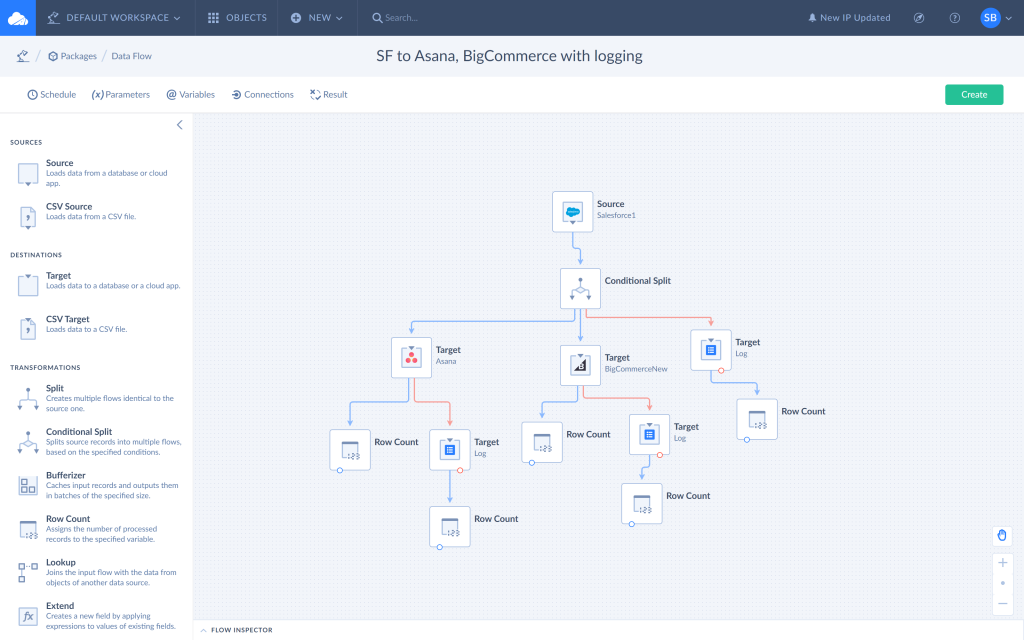
The Skyvia Advantage: Key Rewards for Your Enterprise
Using Skyvia as the data integration solution supplies your business with the following benefits:
- Configurability. This system allows you to build any process for data transfer, transformation, and loading.
- Actual data. Skyvia provides an opportunity to load the most recent data into your data warehouse based on predefined scheduling (up to one time per minute), so you’ll always have the latest data at hand.
- High availability. Being a cloud-based application, Skyvia can be accessed from anywhere and at any time. It needs only a web browser for access and requires no further maintenance.
- Flexible pricing. This tool has a free plan for an unlimited period of time, which would be particularly suitable for small businesses. Those who need a wider feature set and larger storage capacity can enjoy a flexible pricing model applicable to medium-sized businesses and enterprises.
Hevo
Hevo is a data integration platform implementing ETL and ELT scenarios for the financial, retail, and e-commerce sectors. Hevo offers two major products for operating with various data-related tasks: Hevo Pipeline and Hevo Activate. The first solution is the product for ETL and ELT data integration, while Hevo Activate is particularly designed for working with reverse ETL scenarios.
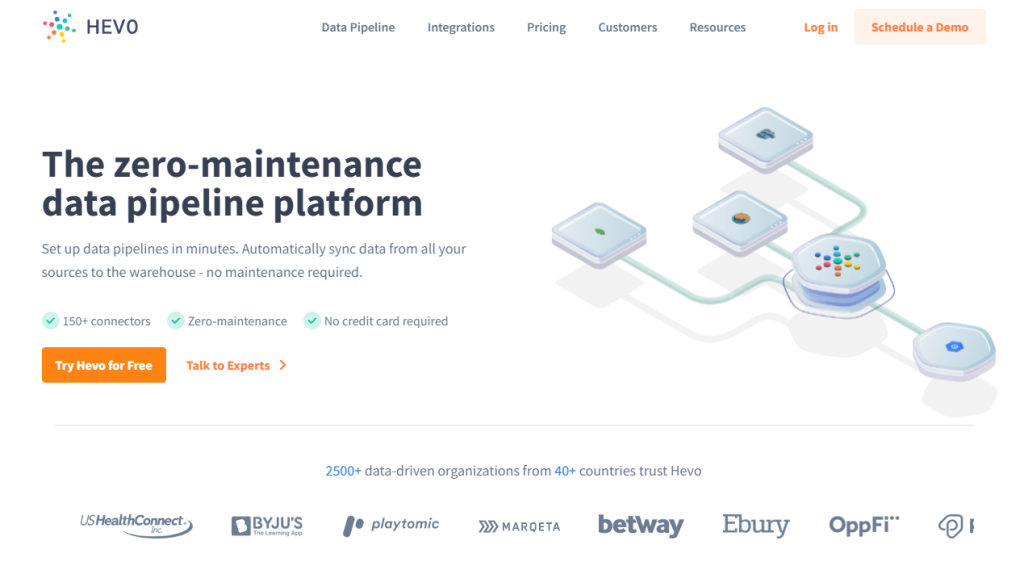
Hevo solutions offer a user-friendly interface, so the data pipeline and transformations could be easily designed via drag-and-drop mechanisms. Alternatively, there is a possibility to use Python coding for defining the needed operations with data. Integrations are possible within cloud-to-cloud applications only.
Comparison to Skyvia
The products Skyvia and Hevo are juxtaposed based on five parameters – see the comparison table below.
| Parameter | Skyvia | Hevo |
|---|---|---|
| Operations with data | Data extraction, ETL, reverse ETL, ELT, data replication, data synchronization, advanced ETL with Data Flow and Control Flow | Data extraction, ETL, reverse ETL, ELT |
| Connectors | 200+ | 150+ |
| Work mode | No-code approach, visual ETL data pipeline designer | Python code, visual drag-and-drop diagrams |
| Developer tools | REST connector for data sources with REST API | Hevo API |
| Pricing | Free plan for any Skyvia product. Then the pricing is calculated based on data volume and features used | Event-based pricing |
Fivetran
Fivetran acts as the ELT tool, so companies prioritizing rapid data ingestion from various platforms would value this tool. Initial setup and establishing connections between sources and target data storages would take some time and coding.
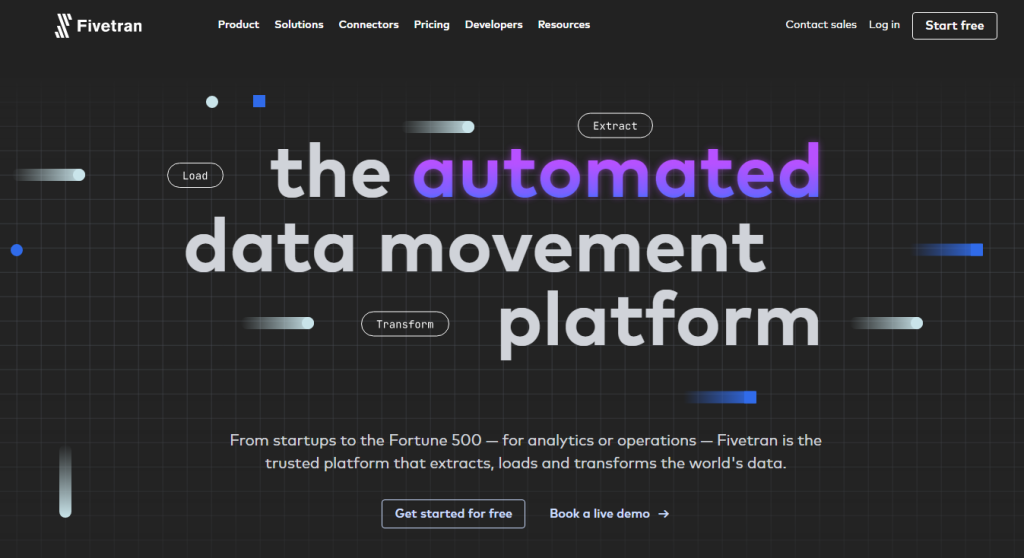
The implementation of Fivetran products would be particularly suitable for marketing, financial, and sales departments. Also, the teams of business data analytics and engineers would benefit from Fivetran. For those who want to further transform the obtained data, Fivertan suggests its transformation solution for the dbt Core.
Comparison to Skyvia
The products Skyvia and Fivetran are juxtaposed based on five parameters – see the comparison table below.
| Parameter | Skyvia | Fivetran |
|---|---|---|
| Operations with data | Data extraction, ETL, reverse ETL, ELT, data replication, data synchronization, advanced ETL with Data Flow and Control Flow | Data extraction, ELT |
| Connectors | 200+ | 360+ |
| Work mode | No-code approach, visual ETL data pipeline designer | Low-code approach |
| Developer tools | REST connector for data sources with REST API | REST API available on certain pricing plans |
| Pricing | Free plan for any Skyvia product. Then the pricing is calculated based on data volume and features used | Volume-based pricing |
Stitch
When there is a need to connect all the data generated from outside and inside some businesses, Stitch is there to help. This platform collects data from cloud apps and SaaS platforms into large data warehouses and data lakes the company uses.
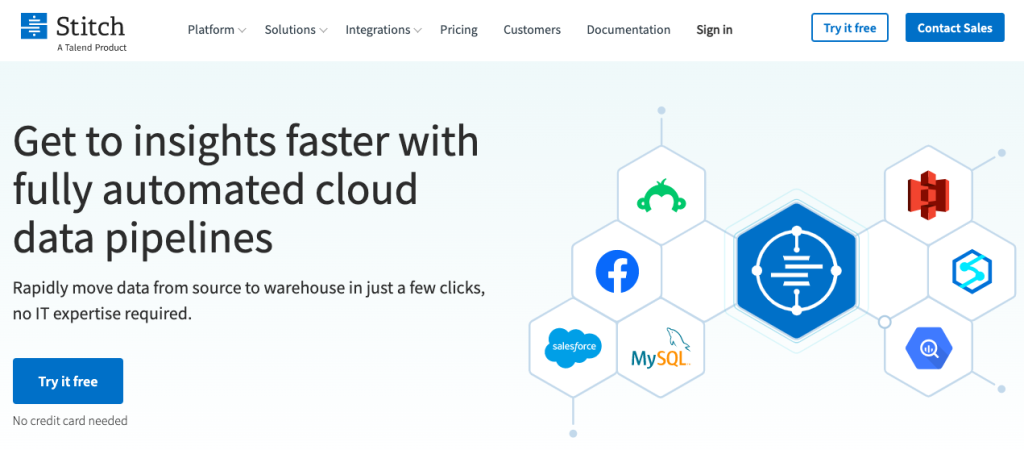
United data gathered from every possible tool with Stitch and processed by analytics software provides an overview of business perspectives. Marketing and product development departments could greatly benefit from that.
Comparison to Skyvia
The products Skyvia and Stitch are juxtaposed based on five parameters – see the comparison table below.
| Parameter | Skyvia | Stitch |
|---|---|---|
| Operations with data | Data extraction, ETL, reverse ETL, ELT, data replication, data synchronization, advanced ETL with Data Flow and Control Flow | Data extraction, ELT |
| Connectors | 200+ | 140+ |
| Work mode | No-code approach, visual ETL data pipeline designer | No-code approach |
| Developer tools | REST connector for data sources with REST API | Stitch Connect API |
| Pricing | Free plan for any Skyvia product. Then the pricing is calculated based on data volume and features used | Rows-based pricing |
Matillion
Matillion offers two principal solutions for working with data: batch loader and ETL tool. The first one works on an ELT basis and allows ingesting data from databases and popular applications. Meanwhile, the ETL tool employs mechanisms for data ingestion, its transformation, and further loading into the cloud.
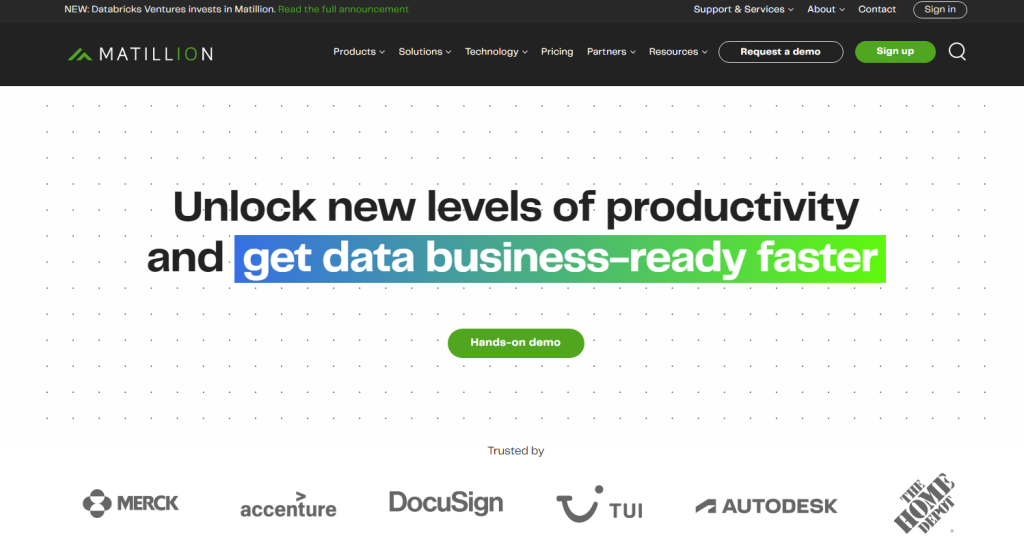
Data scientist teams would particularly benefit from Matillion because it supports big data. Matillion ETL integrates with major cloud providers and their analytical solutions for processing high volumes of data.
Comparison to Skyvia
The products Skyvia and Matillion are juxtaposed based on five parameters – see the comparison table below.
| Parameter | Skyvia | Matillion |
|---|---|---|
| Operations with data | Data extraction, ETL, reverse ETL, ELT, data replication, data synchronization, advanced ETL with Data Flow and Control Flow | Data extraction, ETL, data synchronization, ELT |
| Connectors | 200+ | 140+ |
| Work mode | No-code approach, visual ETL data pipeline designer | Low-code or no-code approach |
| Developer tools | REST connector for data sources with REST API | Matillion ETL API available on REST-based API |
| Pricing | Free plan for any Skyvia product. Then the pricing is calculated based on data volume and features used | No trial Consumption-based |
Talend
Talend product is designed to ensure end-to-end data management – from data ingestion to data governance. This low-code platform allows analyzing data for quality and cleansing it before analysis. Talend Data Fabric supports on-premises implementation as well as cloud-based one.
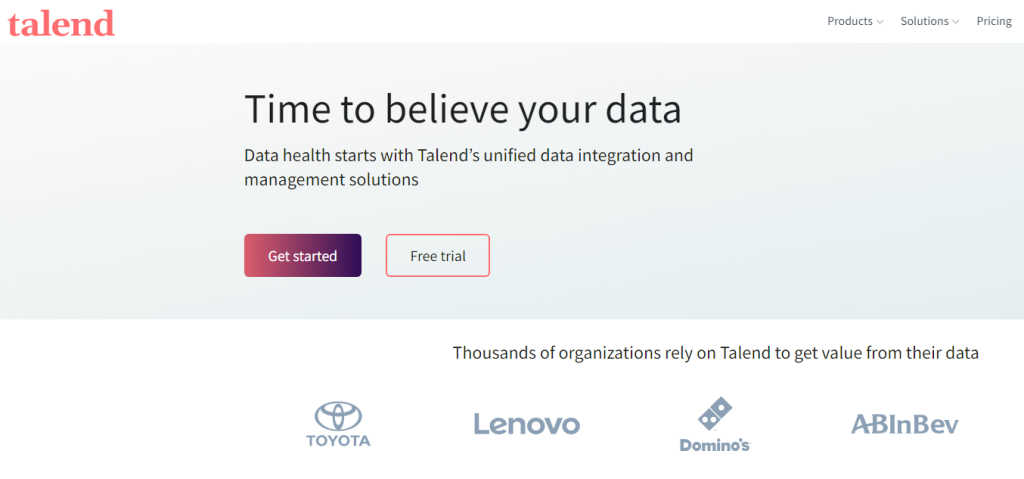
Talend tool would be applicable for sales, marketing, operations, and product development departments. Moreover, this tool combines data from all those units, providing the overall business strategy review to decide whether any adjustments are needed.
Comparison to Skyvia
The products Skyvia and Talend are juxtaposed based on five parameters – see the comparison table below.
| Parameter | Skyvia | Talend |
|---|---|---|
| Operations with data | Data extraction, ETL, reverse ETL, ELT, data replication, data synchronization, data export, data querying, data backup | Data integration, data quality check, data governance |
| Connectors | 200+ | 1000+ |
| Work mode | No-code approach, visual ETL data pipeline designer | Low-code approach |
| Developer tools | REST connector for data sources with REST API | Talend Cloud API |
| Pricing | Free plan for any Skyvia product. Then the pricing is calculated based on data volume and features used | Subscription-based |
Jitterbit
Jitterbit is a sophisticated platform for the integration of multiple applications within the enterprise. Jitterbit is the IPaaS system that combines all the necessary data for business analysts who participate in the lion’s share of decision-making processes. Integrate data to Jitterbit IPaaS using pre-built connectors or by integrating applications with Jitterbit API.
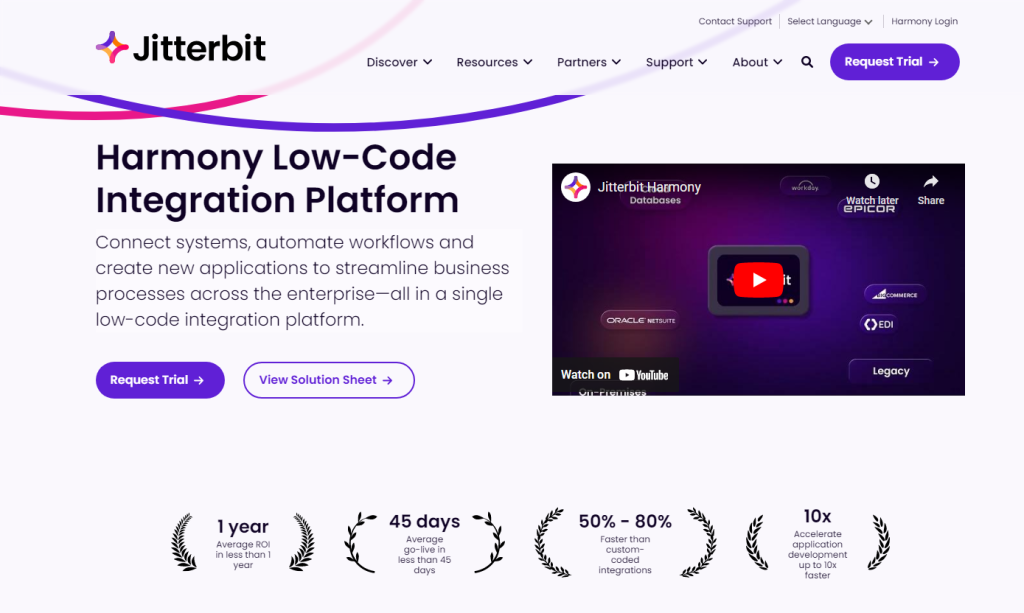
Jitterbit’s principal functions include IT service management, EDI integration, HR management, and employee expense management. Thus, this tool would be highly applicable to IT professionals, marketing specialists, HR managers, and operations departments.
Comparison to Skyvia
The products Skyvia and Jitterbit are juxtaposed based on five parameters – see the comparison table below.
| Parameter | Skyvia | Jitterbit |
|---|---|---|
| Operations with data | Data extraction, ETL, reverse ETL, ELT, data replication, data synchronization, advanced ETL with Data Flow and Control Flow | Application integration |
| Connectors | 200+ | 120+ |
| Work mode | No-code approach, visual ETL data pipeline designer | Low-code approach |
| Developer tools | REST connector for data sources with REST API | Jitterbit’s Harmony API |
| Pricing | Free plan for any Skyvia product. Then the pricing is calculated based on data volume and features used | Subscription-based |
Conclusion
We’ve presented Celigo and its alternatives such as Skyvia, Talend, and many similar solutions in this article. Each of those makes data understanding easier because of aggregating everything into one place. We also recommend having a look at the ETL tools comparison with a detailed description of product features. This will help to make a proper evaluation and decide on which particular solution is capable of resolving business tasks.
If you need a holistic solution for working with data, we recommend considering Skyvia. This platform is fully featured as it provides ETL tools for those who value consistency and ELT tools for those who need instant data load into the central data warehouse. Moreover, Skyvia has other data-related functions businesses can benefit from. Try Skyvia now to see how it helps to streamline each and every business process!


